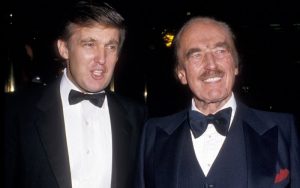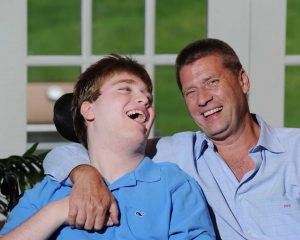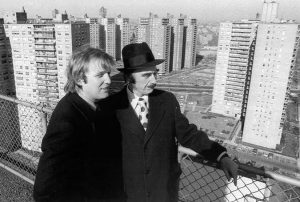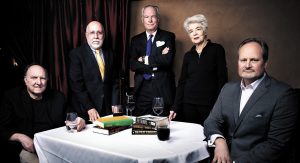Previous post

One cannot fully understand the phenomenon known as Donald J. Trump without first delving into the character of his father, Fred Trump, Sr. (1905-1999). Harry Hurt III recalled running into Fred Trump at a Nathan’s hot dog stand on Coney Island. Donald was taking a flight to somewhere at the time, and Hurt and his assistant overheard Fred say, “I hope his plane crashes.” Hurt told his researcher, “That’s my man. That’s Fred. The apple doesn’t fall far from the tree.”

Fred Trump, Sr. was no one’s image of a loving father. He would tell his offspring, “You’re a killer, you’re a king,” instructing them to never give up, never bog down, drive yourself hard. This was, as Michael D’Antonio tells it, “fatherly love in the Trump universe,” which he found to be disturbing. Major Dobias of the New York Military Academy where Donald was sent during his high school years described Fred Trump as “very German,” by which he meant very tough, demanding, and cold. Kids who attended school with Donald and Fred Trump, Jr. said that Fred Sr. was a terror. Even now, Donald Trump doesn’t use any other word to describe his father other than “tough.”
Then there was Fred Trump, Jr. — “Freddy,” the black sheep of the family.
Donald Trump’s elder brother Fred Trump, Jr. was quite troubled, and terrified of his father. Fred Sr. didn’t like his son; he didn’t live up the to the strict expectations of the patriarch. Preferring to fly airplanes and deep-sea fish, Fred Jr. died of drink in 1981 at the age of 43. Freddy was so despised by his father and subsequently by his siblings that at the time of Fred Sr.’s death in 1999, William, the 18-month-old grandson of Freddy, born with a seizure condition, had his medical coverage by the Trump family terminated, after Fred Trump III, Freddy’s son, sued. Donald was unmoved about the plight of his infant great-nephew: “I can’t help that. It’s cold when someone sues my father. Had he come to see me, things could very possibly have been much different for them.”

What Fred Sr. loved more than anything was building an enormous real estate empire, which he accomplished through subsidies from the Federal Housing Administration or New York State’s Mitchell-Lama housing program. As Wayne Barrett said, “Fred was the consummate state capitalist,” and his son Donald would follow in his footsteps. Democratic political connections were Fred’s secret to success. Barrett told of an interview he held with 1950’s Brooklyn Democrat leader Joe Sharkey where he asked Sharkey, “When did you first see Fred at the FHA?” Sharkey replied, “I went down to Franklin D. Roosevelt’s inaugural, and after the inaugural I went over to the FHA, and Fred was already there.” As Barrett says, “Fred was on top of every loose dollar or possible subsidy, and he was devouring it.”
One person who despised Fred’s business tactics was President Dwight Eisenhower. Eisenhower found that Trump was at the top of a list of many builders profiteering through the use of FHA monies intended to build affordable housing for World War II veterans. Calling the builders, “sons of bitches,” Eisenhower launched an investigation in 1954. Fred Trump testified, outlining the convoluted but narrowly legal means by which he profited from the FHA program, indignantly complaining about the “untold damage to my standing and reputation.”
It appears that Donald learned the art of indignation from his father. Apple and tree, once again.
Here’s a 1985 video of Fred Trump receiving the Horatio Alger Award. No mention is made of the shady deals he made with the FHA and his political cronies.
Fred Trump may have been a cold father, but in his son Donald he must have seen a lot of his own alpha nature, and he also recognized that Donald could also serve as a perfect cover for furthering his empire. During the late 1970’s, the Grand Hyatt Hotel was under construction, and was being promoted as a project by a charismatic young developer named Donald Trump, who was touted as the savior of 42nd Street.

What is largely unknown is that while this was billed as Donald Trump’s project, it was Fred Trump who co-signed the loan. After the FHA scandals, Fred would’ve been seen as the same old hack, there would’ve no funding, and the project would’ve died. Donald served as the perfect, glamorous cover. As Michael Kruse writes, “He couldn’t have done that without his father, and his father couldn’t have done that without his son.”
Funding for the Grand Hyatt construction was not the only Donald Trump project co-signed by Fred Sr. When Donald Trump began his Atlantic City, NJ, casino projects, Fred Sr. was there to co-sign as well. As Barrett tells it:
I tell the tale about how Fred has to come to the closing in Atlantic City, and he’s against Donald going into Atlantic City. But he goes to the closing, they sit up there and sign all the documents with all the mob guys, you know, to buy all the leaseholds. And Fred and Donald leave and they go down to the limo, and somebody upstairs realizes that Fred missed one document. And they call out the window for Fred to come back, because they’re not going to do a deal with Donald.
I mean, I had his tax returns at that time. We got them. . . from the [New Jersey] Division of Gaming Enforcement, and Donald was worth nothing. He was worth nothing. Even the $35 million credit line that they started with for Trump Tower was signed by Fred.
So much for Donald Trump’s canard that he was the brilliant self-starter visionary who built his empire all on his own.
How did Donald Trump demonstrate his reverence for his father?
As Gwenda Blair said, “At Fred’s funeral, where all the kids speak, all the other kids say how sad they are that their dad died, and what a terrific guy he is. Donald talks only about himself.” In her book The Trumps: Three Generations That Build an Empire, she adds:
“At his own father’s funeral, he did not stop patting himself on the back and promoting himself. . . . No matter what happened, including the death of the person who meant more to him than anyone else in the world, from whom he had learned everything he needed to know, to whom he had turned when he needed counsel or comfort or bailing out, he would never relinquish being the center of attention.”
Writer’s Note: This is part one of a four-part series based upon the following articles, along with other selected links and videos, that reveal various NYC journalists’ impressions of Donald Trump and provide insight into him. Politico Magazine has published two insightful articles about Donald Trump in their May/June online editions, the first entitled “Trumpology: A Master Class,” by Susan Glasser and Michael Kruse; and “Tales from the Tabloids,” by Michael Kruse. “Trumpology” consists of conversations held between five journalists who have written books about Trump. They include:
Wayne Barrett, author of Trump: The Deals and the Downfall, 1992.
Harry Hurt III, author of Lost Tycoon: The Many Lives of Donald J. Trump, 1993.
Gwenda Blair, author of The Trumps: Three Generations that Build an Empire, 2000.
Timothy O’Brien, author of TrumpNation: The Art of Being The Donald, 2005.
Michael D’Antonio, author of Never Enough: Donald Trump and the Pursuit of Success, 2015.

“Tales from the Tabloids” features memories of New York tabloid writers from the New York Post and the New York Daily News who dealt with Donald Trump during his early years in the public eye, including George Rush, Lou Colasuonno, Mitchell Fink, Linda Stasi, Frank DiGiacomo, and Pete Hamill.
Tomorrow continues with Trump 101, Part 2: Trump’s Failure at Deals and the Branding that Saved Him.
It was only a matter of time, before the public would be forced to find out about the REAL Donald. As a writer/researcher, I know from experience how difficult it is to dig up, what he has attempted to bury with litigation and intimidation. God bless Wayne Barrett, and others who wrote about him, before he was able to silence his critics. Sadly, by the time his followers learn the truth, it may be too late to stop the Trump trainwreck. Looking forward to the rest of the series.
Wow!! I’ve heard that ol’ Dad Trump was a piece of work. The Donald was nothing clear up to Atlantic City, then. This says a lot….ill be looking forward to you other articles. Thanks.
What struck me is that Fred had to co-sign on EVERYTHING otherwise NO DEAL.
To me that is a sign that the banks or those funding the projects had no confidence in Donald’s abilities to see the projects through and generate a solid return on investment.
My only concern is if Trump can beat Hilary. That’s all. I’d vote for the devil if it stops Hilary.
Tool
7 Comments